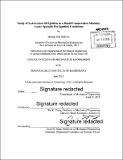| dc.contributor.advisor | Wai K. Cheng. | en_US |
| dc.contributor.author | Sullivan, Morgen Paul | en_US |
| dc.contributor.other | Massachusetts Institute of Technology. Department of Mechanical Engineering. | en_US |
| dc.date.accessioned | 2015-12-16T16:33:46Z | |
| dc.date.available | 2015-12-16T16:33:46Z | |
| dc.date.copyright | 2015 | en_US |
| dc.date.issued | 2015 | en_US |
| dc.identifier.uri | http://hdl.handle.net/1721.1/100352 | |
| dc.description | Thesis: S.M., Massachusetts Institute of Technology, Department of Mechanical Engineering, 2015. | en_US |
| dc.description | Cataloged from PDF version of thesis. | en_US |
| dc.description | Includes bibliographical references (pages 95-97). | en_US |
| dc.description.abstract | In recent years, the industry has shifted toward down-sizing and turbo-charging spark ignition (SI) engines in an effort to increase fuel conversion efficiency. However, this has given rise to a destructive phenomenon known as sporadic pre-ignition (SPI). At low cranking speeds and high loads, engines have been observed to knock violently for brief and infrequent intervals. If allowed to continue, these periods of knock will result in a destroyed engine. This study looks at the propensity of lube oil vapor appearing in the cylinder as a cause for this phenomenon. The theory is that a local oil vapor/air mixture pocket may auto-ignite and start a flame in the charge. The pre-ignition would produce extreme knock. A rapid compression machine (RCM) was used to simulate this scenario and determine if oil vapor can cause SPI, and if so, to relate the auto-ignition tendency to the oil properties. The RCM was used to measure the ignition delay of a cloud of oil vapor in a stoichiometric gasoline/air mixture. The ignition delays were then correlated to chemical and physical properties of the oils. Finally, the effect of diluting the mixture was assessed. The results suggest that lube oil is a plausible source of SPI. The oil ignition delay times are sufficiently short to produce extreme pre-ignition consistent with SPI. Further supporting evidence lies in the fact that oil ignition delay times concur with SPI behavior in engines. It was found that the base stock, degradation, and chemical additives all play a role in oil ignition delay times. The results also demonstrate. that dilution significantly slows auto-ignition of the oil. | en_US |
| dc.description.statementofresponsibility | by Morgen Paul Sullivan. | en_US |
| dc.format.extent | 97 pages | en_US |
| dc.language.iso | eng | en_US |
| dc.publisher | Massachusetts Institute of Technology | en_US |
| dc.rights | M.I.T. theses are protected by copyright. They may be viewed from this source for any purpose, but reproduction or distribution in any format is prohibited without written permission. See provided URL for inquiries about permission. | en_US |
| dc.rights.uri | http://dspace.mit.edu/handle/1721.1/7582 | en_US |
| dc.subject | Mechanical Engineering. | en_US |
| dc.title | Study of lubrication oil ignition in a rapid compression machine under sporadic pre-ignition conditions | en_US |
| dc.type | Thesis | en_US |
| dc.description.degree | S.M. | en_US |
| dc.contributor.department | Massachusetts Institute of Technology. Department of Mechanical Engineering | |
| dc.identifier.oclc | 931081438 | en_US |
